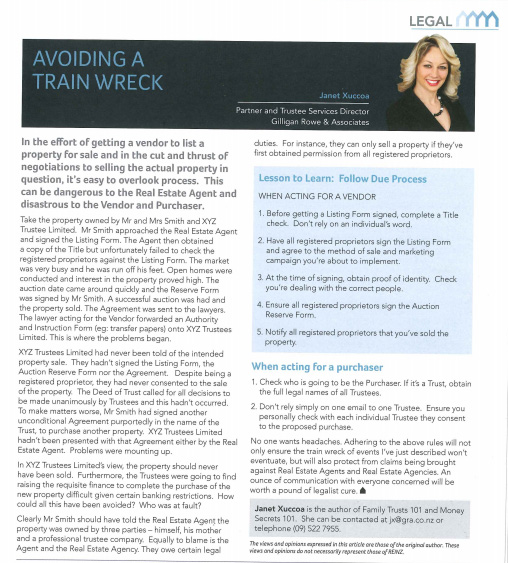
I wrote the following article for the August/September 2015 issue of REINZ Magazine, which was sent to all real estate agents within New Zealand. Our Professional Trustee is in demand!
AVOIDING A TRAIN WRECK
In the effort of getting a vendor to list a property for sale and in the cut and thrust of negotiations to selling the actual property in question, it's easy to overlook process. This can be dangerous to the Real Estate Agent and disastrous to the Vendor and Purchaser.
 Take the property owned by Mr and Mrs Smith and XYZ Trustee Limited. Mr Smith approached the Real Estate Agent and signed the Listing Form. The Agent then obtained a copy of the Title but unfortunately failed to check the registered proprietors against the Listing Form. The market was very busy and he was run off his feet. Open homes were conducted and interest in the property proved high. The auction date came around quickly and the Reserve Form was signed by Mr Smith. A successful auction was had and the property sold. The Agreement was sent to the lawyers. The lawyer acting for the Vendor forwarded an Authority and Instruction Form (eg: transfer papers) onto XYZ Trustees Limited. This is where the problems began.
Take the property owned by Mr and Mrs Smith and XYZ Trustee Limited. Mr Smith approached the Real Estate Agent and signed the Listing Form. The Agent then obtained a copy of the Title but unfortunately failed to check the registered proprietors against the Listing Form. The market was very busy and he was run off his feet. Open homes were conducted and interest in the property proved high. The auction date came around quickly and the Reserve Form was signed by Mr Smith. A successful auction was had and the property sold. The Agreement was sent to the lawyers. The lawyer acting for the Vendor forwarded an Authority and Instruction Form (eg: transfer papers) onto XYZ Trustees Limited. This is where the problems began.
XYZ Trustees Limited had never been told of the intended property sale. They hadn't signed the Listing Form, the Auction Reserve Form nor the Agreement. Despite being a registered proprietor, they had never consented to the sale of the property. The Deed of Trust called for all decisions to be made unanimously by Trustees and this hadn't occurred. To make matters worse, Mr Smith had signed another unconditional Agreement purportedly in the name of the Trust, to purchase another property. XYZ Trustees Limited hadn't been presented with that Agreement either by the Real Estate Agent. Problems were mounting up.
In XYZ Trustees Limited's view, the property should never have been sold. Furthermore, the Trustees were going to find raising the requisite finance to complete the purchase of the new property difficult given certain banking restrictions. How could all this have been avoided? Who was at fault?
Clearly Mr Smith should have told the Real Estate Agent the property was owned by three parties – himself, his mother and a professional trustee company. Equally to blame is the Agent and the Real Estate Agency. They owe certain legal duties. For instance, they can only sell a property if they've first obtained permission from all registered proprietors.
Lesson to Learn: Follow Due Process
When acting for a vendor
- Before getting a Listing Form signed, complete a Title check. Don't rely on an individual's word.
- Have all registered proprietors sign the Listing Form and agree to the method of sale and marketing campaign you're about to implement.
- At the time of signing, obtain proof of identity. Check you're dealing with the correct people.
- Ensure all registered proprietors sign the Auction Reserve Form.
- Notify all registered proprietors that you've sold the property.
When acting for a purchaser
- Check who is going to be the Purchaser. If it's a Trust, obtain the full legal names of all Trustees.
- Don't rely simply on one email to one Trustee. Ensure you personally check with each individual Trustee they consent to the proposed purchase.
No one wants headaches. Adhering to the above Rules will not only ensure the train wreck of events I've just describe won't eventuate, but will also protect from claims being brought against Real Estate Agents and Real Estate Agencies. An ounce of communication with everyone concerned will be worth a pound of legalist cure.

The Professional Trustee Team
Did you like this article? Subscribe to our newsletter to receive tips, updates and useful information to help you protect your assets and grow your net worth. We're expert accountants providing expert advice to clients in NZ and around the world.
Disclaimer: This article is intended to provide only a summary of the issues associated with the topics covered. It does not purport to be comprehensive nor to provide specific advice. No person should act in reliance on any statement contained within this article without first obtaining specific professional advice. If you require any further information or advice on any matter covered within this article, please contact the author.
Comments
Testimonials
May i just say what a pleasure it has been to deal with GRA over the last few years. Your service and performance have been first class, and I would recommend your company to anyone requiring property related accounting and advice (not something I do very often !!!). - Neil - May 2017
Gilligan Rowe and Associates is a chartered accounting firm specialising in property, asset planning, legal structures, taxation and compliance.
We help new, small and medium property investors become long-term successful investors through our education programmes and property portfolio planning advice. With our deep knowledge and experience, we have assisted hundreds of clients build wealth through property investment.
Learn More








































